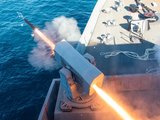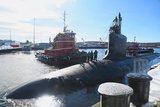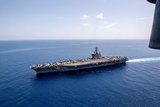China’s maritime security agencies in ‘power struggle’
We all know that China has its own way of doing things, but a new report from Australia's Lowy Institute states the country’s behaviour towards maritime security is becoming ‘unpredictable’.
The author of the report, Linda Jakobsen, says last year's restructuring of China’s maritime law enforcement agencies has led to power struggle between them.
The result is there are many more ‘actors’, a term she uses to describe the various agencies, that are all pushing forward differing maritime policies that benefit each group differently, both commercially and politically.
Jakobsen also believes that the People’s Liberation Army might start taking a
Already have an account? Log in
Want to keep reading this article?
More from Naval Warfare
-
![How the Hedge Strategy will impact the US Navy’s future capabilities]()
How the Hedge Strategy will impact the US Navy’s future capabilities
The US Navy Hedge Strategy is intended to provide a lethal, modular and cost-effective fleet while accepting Washington’s fiscal and industrial constraints.
-
![US Navy and Raytheon explore additional applications for Mk 58 CRAW torpedo]()
US Navy and Raytheon explore additional applications for Mk 58 CRAW torpedo
Designed as an anti-torpedo and anti-submarine capability, the USN and RTX foresee the Compact Rapid Attack Weapon’s potential for deployment from surface ships and aerial and uncrewed platforms.
-
![European navies line up $105.8 billion in unawarded contracts for 2026]()
European navies line up $105.8 billion in unawarded contracts for 2026
France, Germany and Italy lead the way on unawarded naval defence opportunities that could be awarded this year, but across Europe countries are ramping up their spending efforts to face geopolitical challenges.
-
![Spain’s F100 upgrade mirrors Aegis modernisation paths in allied navies]()
Spain’s F100 upgrade mirrors Aegis modernisation paths in allied navies
The Spanish Navy’s Alvaro de Bazan-class of air defence frigates will receive the latest Aegis Weapon System technology among other modernisations to extend the service life to 2045.






















